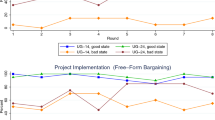Abstract
Do greater potential gains from trade enhance or erode contracting institutions? In an anonymous exchange environment traders can sign a contract, hence agreeing to interact with the assigned partner, or wait till the next match. Any contract can be endorsed (for a payment) by the enforcement agency, which then observes the interaction with a positive probability known to the traders and punishes any detected infractors. Demand for contract enforcement is the highest amount a proposer of a contract is ready to pay to the agency, in a stationary subgame perfect equilibrium. It may be strictly positive, as we show, even when contracts are broken. Surprisingly, larger potential gains from exchange may dampen the demand, but not always: the demand is boosted under agencies that oversee the interactions frequently.
Similar content being viewed by others
References
Acemoglu D, Johnson S (2005) Unbundling institutions. J Political Econ 113: 949–995
Acemoglu D, Johnson S, Robinson J (2005) Institutions as a fundamental cause of long-run growth. Handbook Econ Growth 1: 385–472
Al-Najjar N (2008) Large games and the law of large numbers. Games Econ Behav 64(1): 1–34
Bidner C, Francois P (2011) Cultivating trust: norms, institutions and the implications of scale. Econ J 121(555): 1097–1129
Bös D, Kolmar M (2003) Anarchy, efficiency and redistribution. J Public Econ 87(11): 2431–2457
Boukouras A (2011) Contract law and development: poverty, equity and growth-discussion papers. Courant Research Centre, Goettingen
Calvert RL (1998) Explaining social order: internalization, external enforcement, or equilibrium?. In: Soltan K, Uslaner EM, Haufler V (eds) Institutions and social order. The University of Michigan Press, Ann Arbor, pp 131–161
Coase RH (1960) The problem of social cost. J Law Econ 3: 1–44
de~Mesquita E B, Stephenson M (2006) Legal institutions and informal networks. J Theor Politics 18(1): 40–67
DeMichelis S, Germano F (2000) On the indices of zeros of Nash fields. J Econ Theory 94: 192–217
Dhillon A, Rigolini J (2011) Development and the interaction of enforcement institutions. J Public Econ 95(1): 79–87
Dixit A (2003a) On modes of economic governance. Econometrica 71: 449–481
Dixit A (2003b) Trade expansion and contract enforcement. J Political Econ 111: 1293–1317
Dixit A (2004) Lawlessness and economics: alternative modes of governance. Princeton University Press, Princeton
Fafchamps M (2002) Spontaneous market emergence. Topics Theor Econ 2, article 2
Fafchamps M, Minten B (2001) Property rights in a flea market economy. Econ Dev Cult Chang 49: 229–267
Foucault M (1975) Surveiller et Punir; Naissance de la Prison. Gallimard, Paris
Gonzalez FM (2007) Effective property rights, conflict and growth. J Econ Theory 137: 127–138
Greif A (2005) Institutions: theory and history. Cambridge University Press, Cambridge
Grossman H (2001) The creation of effective property rights. Am Econ Rev 91(2): 347–352
Grossman H, Kim M (1996) Predation and accumulation. J Econ Growth 1: 333–350
Hoffmann M (2010) Enforcement of property rights in a barter economy. Soc Choice Welf 3(2): 249–263
Jastrow M (1915) The civilization of Babylonia and Assyria, 2nd edn. J. B. Lippincott Company, London
Kandori M (1995) Social norms and community enforcement. Rev Econ Stud 59(1): 63–80
Kirchheimer O, Rusche G (1939) Punishment and social structure. Columbia University Press, New York
Kiyotaki N, Wright R (1993) A search-theoretic approach to monetary economics. Am Econ Rev 83(1): 63–77
Moselle B, Polak B (2001) A model of a predatory state. J Law Econ Organ 17: 1–33
North D (1984) Government and the cost of exchange in history. J Econ Hist 44: 255–264
Nozick R (1974) Anarchy, state and Utopia. Basic Books, New York
Piccione M, Rubinstein A (2007) Equilibrium in the jungle. Econ J 117: 883–896
Polishchuk L, Savvateev A (2004) Spontaneous (non) emergence of property rights. Econ Transition 12(1): 103–127
Skaperdas S (1992) Cooperation, conflict, and power in the absence of property rights. Am Econ Rev 82(5): 720–739
Sonin K (2003) Why the rich may favor poor protection of property rights. J Comp Econ 31(4): 715–731
Stigler GJ (1992) Law or economics?. J Law Econ 35(2): 455–468
Umbeck J (1981) Might makes rights: a theory of the formation and initial distribution of property rights. Econ Inq 19: 38–59
Author information
Authors and Affiliations
Corresponding author
Rights and permissions
About this article
Cite this article
Rubinchik, A., Samaniego, R.M. Demand for contract enforcement in a barter environment. Soc Choice Welf 41, 73–97 (2013). https://doi.org/10.1007/s00355-012-0670-6
Received:
Accepted:
Published:
Issue Date:
DOI: https://doi.org/10.1007/s00355-012-0670-6




